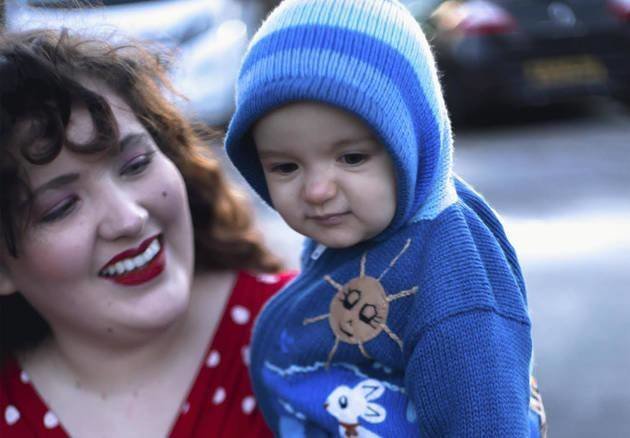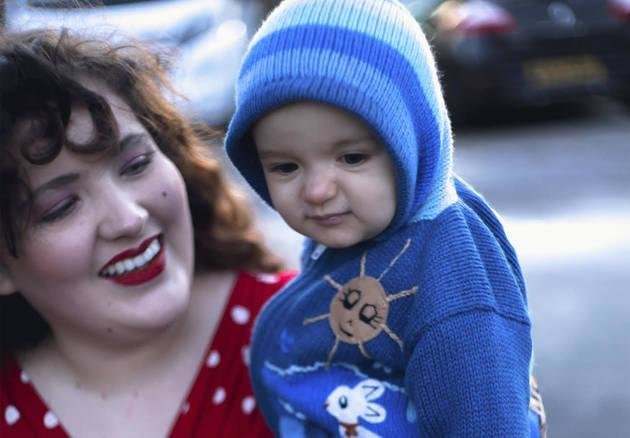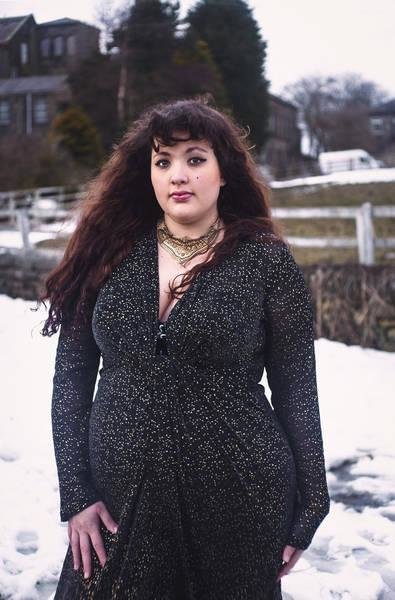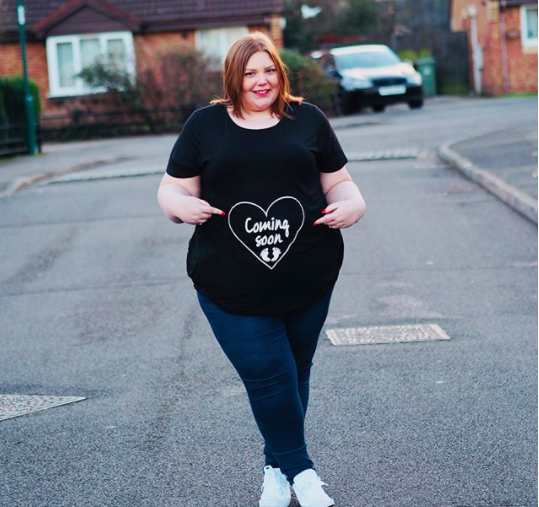I spent over 10 years of my life convinced that I’d never be able to conceive my own children. From the age of 14 and onwards, doctors seemingly couldn’t wait to tell me about the infertility rates of plus-size women, particularly those with polycystic ovarian syndrome (PCOS) — a condition characterized by irregular periods and excess hormones in the body — like myself. Now, at 27, I wish I could go back and visit that first ob-byn — the one who told me I’d have to drop at least 70 pounds if ever I wanted to have kids in the future. I wish I could shove my beautiful daughter in his face, along with the precious baby bump I carry as I expect a second little girl.
I have always wanted to be a mother. As a young child, my baby dolls weren’t just pieces of inanimate plastic; they were little beings I could look after, creatures on which to bestow the maternal instincts I always seemed to have. If you were to ask any friend I’ve had in the last 27 years, they’d likely tell you that I’m the caretaker of the group — the one who’s always there to remind you to put on your coat or wooly hat on a cold day; the one who makes everyone sandwiches and packs a bag of snacks for day trips; the one people call when they need a good cry.
Even at 14, when I first heard that I’d probably never conceive children, I was devastated. I mourned for my future self, for the image I’d begun crafting of how my life might look. I was already in the early days of a lifelong battle against my body — a body that was mocked at school for taking up too much space, a body that seemed to breed shame in my family. Hearing that my body was also ruining my chances of becoming a mom only made it worse.
I’m certain that most plus-size women, particularly those who’ve expressed the desire to conceive to their doctors, are familiar with the damning research that tells them why pregnancy isn’t “meant” for them. According to the American College of Obstetrics and Gynecology, “Obesity during pregnancy puts you at risk of several serious health problems.” If a woman clinically categorized as “overweight” or “obese” actually manages to conceive, the chances of early miscarriage, gestational diabetes, high blood pressure, and blood clots are all said to increase. If the baby is carried successfully to term, it could still be at risk of a “high birth weight,” thus decreasing the possibility of a vaginal birth.
I’m not a doctor, and I have no desire to claim that the studies and statistics are wholly inaccurate. I’ve met plenty of plus-size women, both with and without PCOS, who’ve indeed struggled to get pregnant, much like I’ve met plenty of thin women who could say the same. What I will say is that experience has proven to me, time and time again, that doctors don’t always have all the answers. They don’t always know how your body will react to certain situations. They don’t always know what’s best, or true, for you as an individual.
Marie Southard Ospina
The truth is, I haven’t struggled to conceive in either of my pregnancies. My first daughter was a surprise. I had been on the contraceptive pill, and shown no pregnancy symptoms. By that point in my life, at least half a dozen doctors had deemed me “close to infertile.” My PCOS was thought to be so severe that conception, even with costly fertility treatments, was “highly unlikely.” A few doctors here and there said that I might get knocked up if I lost 100 pounds or so (no biggie, right?). Most didn’t even bother trying to offer me that “hope.”
But I went on to have a healthy baby anyway, only to get pregnant with another in a year. My husband and I didn’t have to try to conceive the second time, either. We found out we were expecting another child seven weeks into the pregnancy. Once again, I’d been on birth control (although I definitely missed a couple of pills that time around). Once again, I could see my doctors’ faces contorting in astonishment.
Marie Southard Ospina
At the time of conception in both of my pregnancies, I was over 250 pounds, and my weight has remained a favorite topic of conversation among my health practitioners — practitioners who have never bothered to acknowledge that they were wrong in telling me I was infertile.
I’ve been asked to closely monitor my weight gain while pregnant, lest I gain too much and further “complicate things.” I’ve been asked to consider weight loss after labor, so I can “be healthier for my children.” I’ve been reminded, more times than I’d like to count, that my weight alone puts me and my babies “at risk.”
So far, however, the warnings haven’t been true. My first pregnancy couldn’t have been more perfect. I only experienced morning sickness one or two times. I was free of aches and pains until about eight months in. My daughter’s birth weight was actually below average, and I was able to deliver vaginally, despite my doctor’s insistence that I’d need a C-section. Fifteen months later, my kid is happy and well. She’s never been ill, apart from a common cold or two. Twenty weeks into pregnancy number two, things are going just as smoothly. No complications. No concerns. No red flags on my scans.
And I’m not the only one, either. UK plus-size style blogger Hollie Burgess of Pretty Big Butterflies also got “pregnant very quickly,” despite being classified as morbidly obese and less likely to conceive in the medical world.
“I thought it would take me years to conceive as I was ‘overweight’ and had been on the contraceptive pill for a long time,” she tells CafeMom. “I was prepping myself to follow those fertile window diaries and looking for foods to help make you fertile, etc., but in the end, I didn’t need it.”
Now pregnant with her second child, Burgess knows she’s monitored extra closely by the medical community based on her weight alone. “When I was first pregnant, they had something called BMI pathway, which basically was a huge tick-box sheet about the extra tests, scans, and appointments I had to have because I had a high BMI,” she explains. “Being put into a category was scary and made me feel extremely anxious. But looking back, I got to see my little bean in my belly more than an average woman does in her pregnancy and actually I appreciated the extra care. I think all women should receive that amount of attention, but just not be made to feel like something is definitely going to go wrong.”
Courtesy Hollie Burgess
Burgess adds, “I am not a miracle. I am not a robot. I am not superhuman … [But] I didn’t put on weight, I didn’t have high blood pressure, I didn’t have a big baby. I had a really great pregnancy … I am a plus-size woman who has had a healthy pregnancy and baby boy. If I can do it, it means it is possible.”
All around the world, other plus-size mamas — many of whom were told they should be concerned about their weight when it came to conception — could say the same. Blogger Courtney Mina, model Tess Holliday, and influencer Dana Martinez have all been open about having smooth pregnancies and healthy children, regardless of their BMI.
None of this is said to brag or boast about conceiving easily, and it’s certainly not meant to shame mothers (of any weight) who struggle to conceive. No one is at fault for those challenges or for having a “difficult” pregnancy — regardless of how often the “medical industrial complex” would like us to believe otherwise. This is all to say, instead, that you can get pregnant when you’re fat; you can have a lovely, problem-free pregnancy when you’re fat; you can have a healthy child when you’re fat; you can, very often, have precisely the kind of life you want to have when you’re fat.
Sometimes it’s crucial that we listen to our doctors — but sometimes, it’s best that we listen to ourselves.




